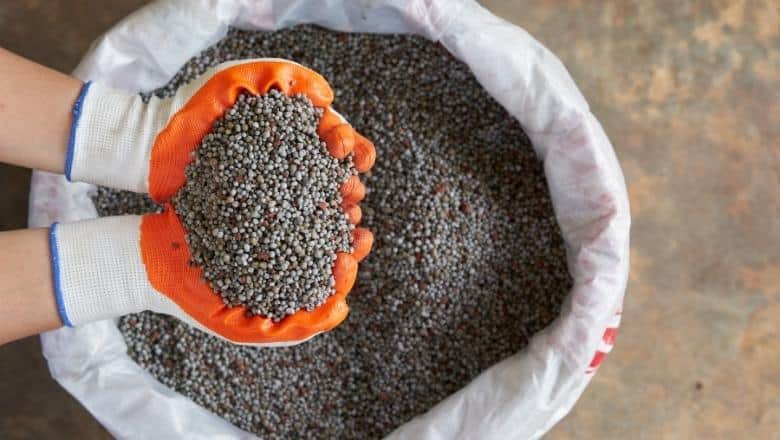Do Olive Trees Need Fertilizer?
Olive Knowledge is a part of Amazon Associates. As an Amazon Associate, we earn from qualifying purchases. Read our Affiliate Disclosure to learn more.

While olive trees can tolerate poor growing conditions, it doesn’t mean that they don’t need any additional nutrients at all. In this post, I’ll show you whether olive trees require fertilizers and the potential risks of not providing olive trees with any micro and macronutrients.
Key Takeaways:
- Olive trees can grow without fertilizers, but don’t expect them to grow into healthy trees with plenty of fruit.
- Fertilized olive trees have a much better yield and health and have fewer problems with pests.
- The most crucial nutrients are Nitrogen, Phosphorus, and Potassium.
Why You Should Fertilize Olive Trees
Without proper nutrients, no plant can grow to its maximum. The same situation is with olive trees. Plants, when lacking nutrients, will try their best to get more nutrients from the soil (developing roots) instead of growing trunk branches and, of course, bearing fruits.
Reasons why you should fertilize olive trees:
- Fertilizers will supplement the lack of nutrients in the soil.
- Those nutrients will make soil an ideal place of growth for the trees.
- Olive trees will grow quicker and healthier.
- It can help olive trees to stay pest-free.
- Olive trees will produce more fruit.
- Feeding olive trees will extend their lifetime.
- According to research, olive tree yield increases a lot with higher Nitrogen levels.
Not only the tree will be healthy, but you’ll also be happy with the results of fertilization. When olive trees grow properly, without some diseases, and bear plenty of fruit every year, we, olive growers, are the happiest. We’ll get a bunch of fruit, with which we can make olive oil and other products made of olives.
Again, there’s no place on Earth where the soil has the exact amount of nutrients olive trees need for proper growth. Luckily, we can easily change that by fertilizing them regularly.
No rich harvests have ever happened without proper care for olive trees, so keep that in mind.
How Often To Fertilize Olive Trees

Olive trees don’t need fertilizers very often. Many olive growers do it only a couple of times a year. On the other hand, people that grow olive trees in pots, probably do it more often, but in smaller portions. Since my goal with this site is to encourage people to grow olives in the ground, I’ll mainly concentrate on that.
There are 5 main types of olive tree fertilization processes:
- Basic olive tree fertilization (fills the soil with basic nutrients).
- Supplementary olive tree fertilization (stimulates quicker growth of the tree and prepares it for flowering).
- Foliar fertilization (specific nutrients for the best possible fruit yield and quality, as well as pest prevention).
- Organic fertilization (keeps the soil fertile for a long time and replenishes many important nutrients).
- Reclamation fertilization (stimulates the initial growth of newly planted olive trees).
Basic and supplementary fertilization are the main processes and should be done every year (for mature trees). These two processes will feed the tree with the most important nutrients for healthy olive tree growth and great olive yield.
Each of these fertilization processes is performed at different times of the year, and to make it easier for you, I made a comprehensive table in which I’ll show you the basic nutrients used in each method, as well as the ideal time of fertilization. Check it out below.
| Basic Nutrients | Application Period | How Often | |
| Basic Fertilization | NPK – Nitrogen, Phosphorus, Pottasium | September to November | Once a year |
| Supplementary Fertilization | Nitrogen-rich fertilizers: UREA 46%, KAN 27%, or similar | Late February and Early April | Two applications (1st in February, 2nd in April) |
| Foliar Fertilization | Boron, calcium, iron, copper, magnesium, zinc | Before the flowering process (April and May) and after the fruit fertilization process (June). Otherwise, if needed, because of the plant conditions. | A few times a year, depending on the tree conditions. Mostly 2-4 times a year |
| Organic Fertilization | Fertilizers from animal and plant origin (horse and cow manure mostly) | In Autumn | Every 3-4 years |
| Reclamation Fertilization | NPK (Nitrogen, Phosphorus, Pottasium), and manures | Only before planting olive trees | Just once |
What Type Of Fertilizers Is Best For Olive Trees
There are two main types of fertilizers: organic and synthetic. Both of them have both pros and cons. In my experience, I had to use both because of the micro and macronutrient differences in them, but I try to use organic fertilizers more whenever possible.
Synthetic fertilizers will have higher amounts of nutrients, and they’ll start feeding the tree immediately (fast-acting). Also, they’re much cheaper, making them a great choice for people on a budget. The best thing about synthetic fertilizers is that you’ll often find them specifically formulated for specific kinds of trees.
The biggest con of synthetic fertilizers is that you could damage the trees if you overapply them. That’s because they have high amounts of chemical nutrients.
Organic fertilizers have smaller amounts of nutrients, but they’ll feed the tree for much longer, and they’re also great for the soil when looking long-term. If you want all the best for your olive tree’s long-term, you should aim for organic fertilizers. Even though they cost more, I think they’re worth it. Especially if you’re a small olive grower and you don’t look for the ROI (return on investment) only but for the quality of the olive products, too.
Related: Best Olive Tree Fertilizers
In the end, it’s up to you to decide, depending on your needs and wishes. If you wish to have completely organically grown olive trees – you know what to do. On the other hand, if you want to get the most out of the tree (yield, etc.), you’ll opt for synthetic ones.
Again, in my opinion, a mix of both is probably the best and most profitable option.
What If You Never Fertilize Olive Trees
I think that by now, you already know that feeding olive trees is extremely important for their growth and yield. However, I want to quickly remind you what could happen if you never fertilize olive trees in your farm, garden, or pots.
Olive trees that aren’t fed with fertilizers may:
- Grow very slowly
- Develop only roots instead of the canopy (because they’ll search for nutrients in the ground)
- They won’t yield so many fruits
- Maybe more vulnerable to pests and diseases
- Fruits won’t be full of olive oil
- Trees won’t live as long as they could if you fertilize them
These were the most important things that could happen if you never fertilize olive trees. Of course, there are many other things, but even only a few above are more than enough to realize why fertilizing olive trees is essential.
Conclusion
Fertilizing olive trees is one of the most important things you should do if you expect them to grow properly and yield many fruits every single year. In the near future, I’ll be writing guides on fertilizing olive trees, where I’ll explain each method and each step you should take, so stay tuned. Until then, here’s a great and short pdf about fertilizing olive trees.
My goal with olive trees is to keep them healthy as long as possible and „force“ them to bear a lot of fruit so I can make enough olive oil for my family. I suppose your goals are similar, too. To accomplish those goals, many steps are needed, and fertilizing trees is one of them.
In my opinion, fertilizing olive trees is almost as important as regularly watering them. That’s how important it is.
I also recommend you check out my guide on how to fertilize olive trees for large yields. In that post, you’ll learn everything in a more detailed way and know exactly what and when to do.
